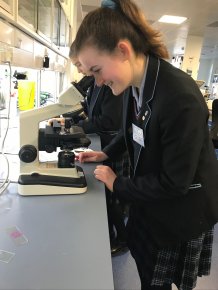
A student from Wellington School examines DNA under a microscope
School children unpick genetic riddle in University labs
Pupils from schools across the Westcountry used genetic processes commonly seen in TV crime dramas to help solve the mystery of who sabotaged Devon’s very own Bake Off.
Using state-of-the-art microbiology and DNA analysis techniques, Year 9s from Devon, Dorset and Somerset helped scientists from the University of Exeter Medical School unravel a scandal which erupted in the “Great Bideford Bake Off”.
The scenario involved an outcry as the Westcountry’s most talented bread makers ended up with soggy bottoms as their loaves failed to rise, and the spoiled bread tasted mysteriously sugary. Who introduced a mutant yeast to rig the contest?
The pupils made up a crack team of nearly 200 science sleuths, known as the Men in White, so titled to challenge stereotypes around scientists. They worked with special operatives from the University of Exeter Medical School on March 21 and 22. They used all their genetics genius to identify which supervillain was guilty.
Now in its thirteenth year, the Medical School’s popular outreach event engaged Year 9s from 11 schools. The plot saw pupils stain yeast DNA on slides and examine them under microscopes to find the mutant strain, as well as trying out clinical procedures such as blood sugar sampling and blood pressure testing to learn more about their bodies. This was the second time the event took place in the Medical School’s new laboratories in the Research, Innovation, Learning and Development (RILD) building on the Royal Devon & Exeter Hospital site.
Professor Lorna Harries, one of the organisers of the event, which aims to make science more accessible, said: “This is a fun, interactive way to gain a real understanding of some complex scientific concepts. The pupils worked alongside real scientists, and we wanted to bust some myths that we’re all fuddy-duddy men in white coats.”
Co-organiser Dr John Chilton said: “It’s critical that we motivate the next generation of Devon-bred scientists to consider a career in a stimulating and innovative subject at the cutting-edge of discovery. Our relocation to RILD meant that we could welcome more pupils than ever before. Who knows - some of them may one day come and join our world-leading research team here at Exeter.”
Laura Tabb, head of Science at Wellington School in Somerset, said: “This activity is brilliant for the students. It allows them to engage with real scientists in a lab and look at how science is done in the real world. It enables them to apply what they’ve done in lessons and opens their eyes to science beyond what they see in the movies.”
Year 9 student Felicity, of Wellington School, said: “It’s been a really interesting day. I’ve learned so many new things and it’s great to see real scientists at work. I love biology and I’m now thinking about university choices and how I could pursue a career in science.”
Paul Hocking, Assistant Principal at Torquay Academy, said: “It’s really useful for students to see science I the workplace and see the aspirational career choices that they could pick by pursuing science.”
Tom, a student from Torquay Academy, said it was his first time in a professional laboratory: “It’s been really interesting to learn about diabetes and great to get into the labs too – it makes you think about what careers are available in science.”
Florrie, from St Peter’s School in Exeter, said: It’s been really interesting to look at the microscopes and the equipment that they use in working labs.”
Louisa Salisbury, from St Peter’s School, said: “I think it’s really important for the students to see what real science is like and to get an insight into a career in research.”
The schools involved over the two days were:
Weds AM: Torquay Academy, St Peter’s School, Wellington School
Weds PM: Okehampton College, St James Secondary School, South Dartmoor School
Thurs AM: Exeter School, Newton Abbot College, Exmouth Community College
Thurs PM: Woodroffe School, Cranbrook Education Campus
Date: 22 March 2018
